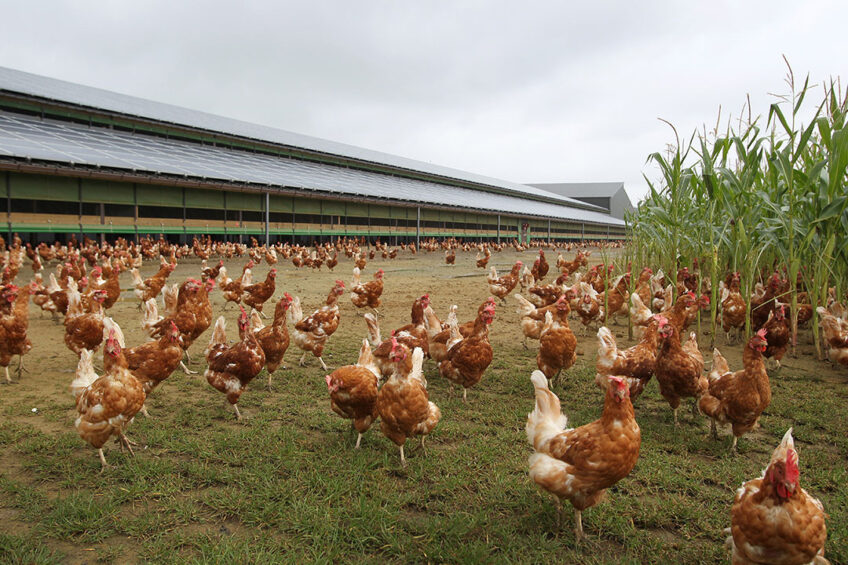Blueprint for sustainable egg production

Egg farmers of Canada has released its first Sustainability Report, outlining how egg farmers there are investing in and implementing sustainable technology and practices. The Report also covers initiatives and programmes that set out new opportunities for the future.
The first Sustainability Report from Egg Farmers of Canada (EFC) has been released. Above all, it sets out a blueprint, says EFC chair, Roger Pelissero, “for how we can build on our current practices as we grow our industry, putting egg farming at the forefront of sustainable agriculture”. The Report covers many key themes. It further sets out EFC’s commitment to sustainability, presents concrete ways in which egg farmers are making changes and highlights recent advances in the Canadian egg industry. Before diving into some specifics, here is a quick overview of the long-term progress made in Canadian egg production.
Compared to 5 decades ago, 50% more eggs are now being produced in Canada while the sector’s overall environmental footprint is almost 50% smaller. Research has specifically found that between 1962 and 2012, Canadian egg farmers reduced energy use by 41% and water consumption by 69%. Adoption of technology, such as automatic adjustments to the barn environment, has played a role, as have precision agricultural techniques. In 2015, EFC conducted a life-cycle assessment (LCA) to understand more precisely how the production of eggs affects the environment in terms of resource use and emissions. “Canadian egg farmers have reduced greenhouse gas emissions, heating and electricity use, and increasingly use LED lights, renewable energy and other efficiencies,” adds EFC CEO Tim Lambert. “Genetics continue to improve and feed companies are working towards better digestibility, immune system support and more.”
Current initiatives
EFC is now working towards the launch of a new way to inform sustainability activity and decision-making for egg farmers in Canada and potentially in other countries, too – the National Environmental Sustainability Tool (NEST). It’s expected to hit farms in 2022. “We have already benchmarked where we were in terms of dozens of sustainability parameters,” says Lambert. “Now, we are focused on how we can continue to do better. Under the guidance of Dr Nathan Pelletier, the NEST tool will offer farmers a sophisticated analysis tool with the ability to benchmark against other farms in their region and across the country.” As part of its sustainability commitment, EFC supports a network of research chairs, including Dr Nathan Pelletier at the University of British Columbia.

Lambert adds – that because egg farmers collect a massive amount of data on energy use, feed consumption, water use, mortality, health and so on – “what we’re doing [with NEST] is facilitating the aggregation of this information in an anonymous way, so that farmers can see where they fit in the broader spectrum of energy use, for example, and consider options to conserve more.” However, Lambert explains that since egg production is arguably already the animal protein with the lowest environmental impact and egg farmers are already leaders in sustainable food production, the difference between farmers at the top and bottom of parameters such as electricity use “is certainly less than ever and is narrowing every year”. He adds that all egg farms in Canada are also held to the same animal welfare and food safety standards and are all inspected and audited.
In 2021 EFC is also set to launch a Canadian Coalition for Sustainable Eggs. This initiative will allow the industry to explore opportunities to further improve sustainability, and EFC is currently examining who should be approached for membership. Lambert says it will primarily act as a brainstorming and analysis group.
Unlocking the value of sustainable business practices
Egg producers need more sustainability guidance to measure and track their carbon footprint on their own farm. Find out more…
International activities
In addition, Pelissero and Pelletier sit on the International Egg Commission Environmental Sustainability Expert Group which started in 2020. “We had a sustainability working group with a broad focus that I chaired during the last few years but we wanted to establish a separate sustainability expert group, as well as an international egg nutrition centre,” says Lambert. “As egg nutrition and the role of eggs as a sustainable protein source becomes more well-known around the world, so much the better for all of us.”

Indeed, another valued aspect of sustainability for Egg Farmers of Canada is community engagement. Canadian egg farmers donate to food banks, school breakfast programmes and other organisations across Canada. They also support Heart for Africa, an egg farm and orphanage in Swaziland that, since 2014, has produced and fed more than 6 million eggs to children. There are 275 children now living at the orphanage who enjoy eggs every day and, in addition, hard-boiled eggs are distributed daily to the wider community through a network of churches and schools.

Social media and the public
EFC touts the sustainability of its Canadian farmers through extensive activity on social media, traditional media and in other ways. “It’s important to continue to build that awareness,” says Lambert. “We have come a long way but we have some way to go. We have to communicate that the industry is committed to strengthening our approach… The entire agriculture industry needs to do this.” In Lambert’s view, sustainability is central to success in the Canadian egg industry. “We are committed to continual improvement and the stability of our industry, created by supply management, allows us to make improvements and invest in new technologies,” he says. “It’s the right thing to do, and it’s good for business as well. Consumers expect sustainability. Without it, we can’t have the public trust.”
Sustainability update from Chicken Farmers of Canada
Chicken Farmers of Canada (CFC) has also taken many steps to boost sustainability. For example, CFC already implements initiatives such as on-farm food safety and animal care programmes and 2 years ago conducted its first ever life-cycle assessment (LCA) for Canadian chicken. CFC is using the LCA results to set environmental goals. “What we know is that major gains can be made at both the upstream and downstream ends of the chicken sector – feed, which represents 35% of the carbon footprint, and packaging, for example,” explains Dr Christine Power, CFC director of Animal Care and Sustainability.
CFC has also created funding for a research project on either barn energy use or manure management. In addition, the organisation has joined a coalition of partners in the Canadian agri-food sector to develop the National Index on Agri-Food Performance. Through its participation, CFC will supplement its knowledge of the potential for carbon reduction in the chicken sector and discuss the development of standards used by stakeholders in the agri-food sector.












